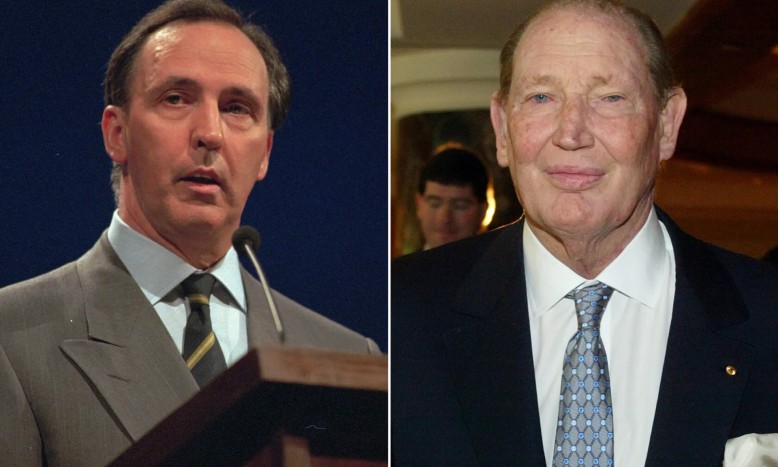In his 2015 interviews with Kerry O’Brien, former Australian Prime Minister Paul Keating describes being approached by Canadian newspaperman Conrad Black, who told him in 1992 that Kerry Packer had acquired 23.5 per cent of the Fairfax Media organisation, owners of the Sydney Morning Herald, despite being restricted by media ownership rules to 14.9 per cent:
PJK: When I checked, Black was correct. Packer’s organisation had taken advice from some barrister specialising in media law who found what they thought was a loophole. From memory, Packer was in Argentina playing polo, so I spoke to one of his representatives and said ‘Conrad Black’s been to see me and I understand Consolidated Press has 23.5 per cent of Fairfax.’
The answer came back immediately. ‘That’s right.’
I said, ‘You understand what the law says? The prescribed limit is 14.9.’
He said, ‘Everything we are doing is legal.’
I said, ‘You may think so but I made the law so I have a particular interest in its maintenance, which means your interest in Fairfax must return to 14.9 per cent.’
He replied, ‘Well, as long as you understand that will mean war, I’ll relay the message.’
…I said, ‘Well, conflict is what I do.’
KOB: This was actually reported at the time in the Sydney Morning Herald. ‘I told Packer yesterday I was in the conflict business. I don’t take the troubles. I give them to people like that.’
PJK: Yes, I said ‘conflict is what I do.’ I then asked Michael Lee, who had become Communications Minister, to get an amendment together and I saw Cheryl Kernot and the Democrats and pushed it very quickly through both Houses, which meant the loophole Packer was using was shut off.
I came to understand that Kerry wanted to control Fairfax to get square with the journalists he believed had gone after him maliciously over the references to him in the National Times under a code name in the Costigan Royal Commission. I understood his anger but we had a media diversity policy that he was not entitled to break…
I’m the only person in public life who ever took Packer on. Ever. This was a person who wielded great influence over a succession of governments, and not one single individual in the polity ever crossed swords with him. I not only crossed swords with him, I gave him a number of beltings. I wanted to make it clear to Packer, you may think we are a bunch of toadies there to do your bidding, but not me.
But Packer came after me after I’d left politics. If you read Niki Savva’s account in her book of how Paul Lyneham volunteered to do Packer’s bidding on the piggery claims against me, aided and abetted by the former Liberal Party President Tony Staley, you’ll see this was all payback for stopping his attempts to control Fairfax…I then lobbied Brian Harradine and a number of other senators to stop the cross-media rule change in the Senate.
A journalist said to me at the time, ‘Mr Keating, are you going to take a defamation action against Channel Nine and Mr Packer?’
I said, ‘No, I have much more expensive remedies in mind for him.’
The remedy I had in mind was to beat the cross-rule amendments in the Senate, which I succeeded in doing…
All those Sydney Morning Herald journalists who went on and on about my delinquency as far as the Herald’s interests were concerned forget the fact that I stopped two major proprietors getting hold of Fairfax. One was Rupert Murdoch, who sought my support in 1995 to take control of the Sydney Morning Herald, the Age and the Financial Review, and the second was Packer’s creeping ownership with a view to controlling the whole organisation, at which point I have no doubt he would have wrought vengeance on some of those same journalists.
KOB: When you knocked Murdoch back, how did he react?
PJK:…I said, ‘Rupert, the thing is, you own the current stable of newspapers. No one else is going to buy them from you, and while ever you own them, whether they’re in trust or not, we can never think of you owning any of the other mastheads.’
KOB: Did he accept that with equanimity?
PJK: He didn’t remonstrate about it at the time but I think Ken Cowley [head of his Australian operation] had conditioned him that that was the answer he would likely get.
KOB: Was there a difference between Murdoch and Packer in that regard, as personalities? There was always that bullying side to Packer that he was notorious for. He could be charming one minute and verbally ripping your head off the next.
PJK: Rupert was always polite and, in the main, charming, even when you said no. You may pay a price later, but he was always polite.
-Paul Keating, Australian, 1944-
-Kerry O’Brien, Australian, 1945-


